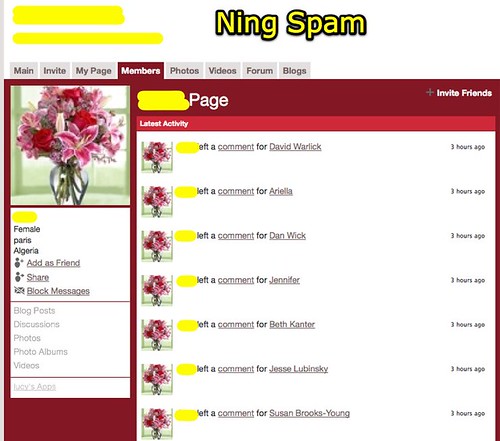Spam is a rampant problem not only with email, but increasingly with Twitter and other social networking sites and platforms including Ning. In the case of our Celebrate Oklahoma Voices learning community (built with Ning) our administrative team moderates new members to try and insure they are educators interested in digital storytelling and oral history, or at least interested parties wanting to contribute to discussions on our site rather than spam members. This is not actually too hard to do: We have some profile questions people must answer when they register on the site, and typically a spammer will either not answer the questions or give non-sensical answers. This has made it pretty easy (to date) to gatekeep “out” spammers.
Unfortunately, learning community administrators are not universally vigilant in dealing with these spam issues. I noticed today a new comment wall spam message on an educational Ning site to which I belong.
Before blocking that user and deleting the profile wall comment they left for me, I clicked on their userid and saw they have apparently spammed lots of other members of the Ning recently.
If you are the administrator of a social network / learning community, particularly one created for educators and/or students, I think you have an obligation to monitor activity on your site and ban spammers like this. This takes time, but this type of site monitoring and maintenance is a key requirement that should go along with the commitment which is made when someone creates or agrees to help monitor / administrate a learning community website.
I’d be very interested to hear your experiences dealing with spammer issues in other Ning sites and learning communities, particularly if you administer or help administer a site that deals with this issue.
Dean Shareski‘s post last week, “Dealing with My/Our Attention and Information Issues,” is one of the best I’ve read in awhile addressing issues of “filtering” and needing to continually refine/upgrade the various filters we use to manage information flows in our lives.
Technorati Tags:
administrator, ning, social, spam, site, comment, network
If you enjoyed this post and found it useful, subscribe to Wes’ free newsletter. Check out Wes’ video tutorial library, “Playing with Media.” Information about more ways to learn with Dr. Wesley Fryer are available on wesfryer.com/after.
On this day..
- Applying STEM Skills with Robotic Sphero Balls (Donor’s Choose Project) – 2014
- Teens use Facebook primarily for private purposes – 2010
- Different Purposes for Using of Digital Tools to Teach Literacy in the College Classroom by Richard Beach – 2010
- Social Media Counter updated for September 2010 – 2010
- Standalone WiFi Skype Phones and Rocket Scientists – 2009
- Visual Tapestry – Flight – 2009
- Visually exploring earth with Panoramio – 2008
- Seeking the elusive “inbox zero” – 2007
- Universities banning Skype – 2006
- Portaportal and flexibly learning new tools – 2006



Comments
3 responses to “Critical for Ning site administrators to address spam”
I was hit by the same spammer you were on that other 2.0 ning. I haven’t looked to see if there’s been a banning yet.
I’m also an admin at another Ning site with a few hundred members. Because we’re an eclectic mix, often we choose to wait for people to actually make a move before we ban them. Once something triggers the process — and usually it’s the wholesale comment thing — but then we act promptly to clean up the mess. We do this by having more than one admin who can boot and ban so that somebody is not too far away and action can usually be taken in a matter of minutes.
You are right. I have reported a few people over at Classroom 2.0 because some people only join in order to advertise their website/company/software etc. The admin have been good at responding, but it would be great if there was a better way to filter it out.
The only way to avoid it is to manually approve members (that’s what I have done on several nings and we’ve been spam free) BUT that’s enough work that it probably discourages a lot of people from starting their own Ning networks. Yes, they need to address this. It’s not so much real people but automated bots that are the worst offenders.